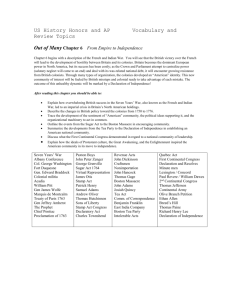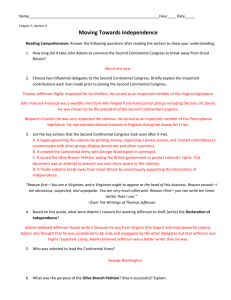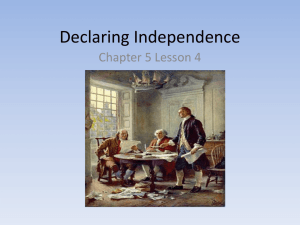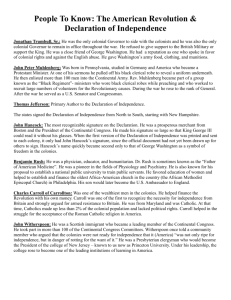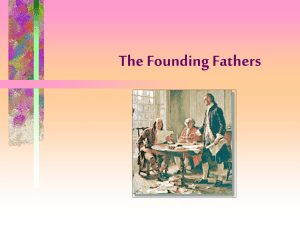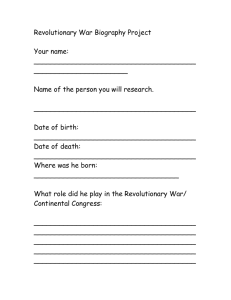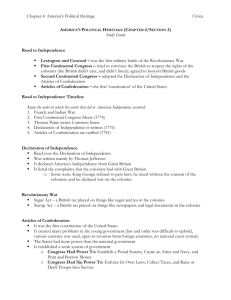Founding Fathers
advertisement
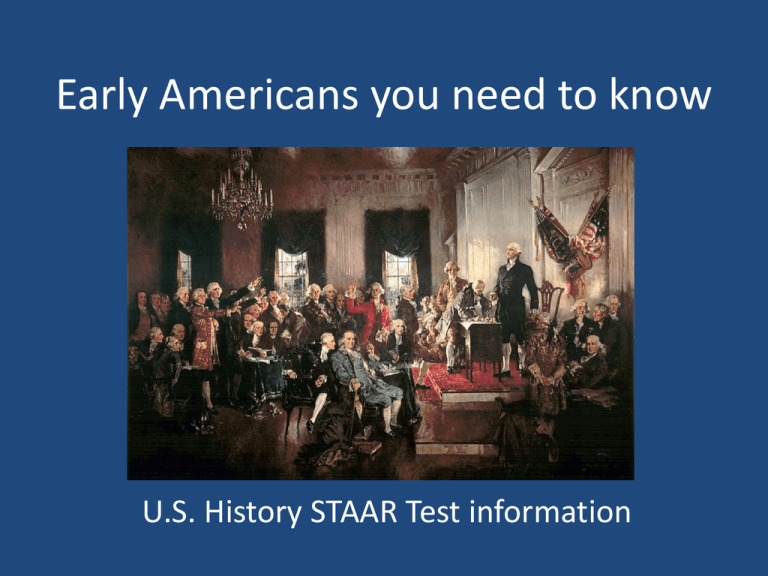
Early Americans you need to know U.S. History STAAR Test information George Washington (1732 -1799) • First President of the United States, the commander-in-chief of the Continental Army during the American Revolutionary War, and one of the Founding Fathers of the United States. He presided over the Constitution Convention, established the position of President, and was hailed as the "father of his country" even during his lifetime. He used the national government to preserve liberty, improve infrastructure, open the western lands for settlement, promote commerce, found a permanent capital, reduce regional tensions and promote a spirit of American nationalism. John Adams (1735 – July 4, 1826) • Second president of the United States, having earlier served as the first vice president. Adams was a statesman, diplomat, and a leading advocate of American independence . Well educated, he was an Enlightenment thinker who promoted republicanism, a strong central government, and wrote prolifically. He was a delegate in the Continental Congress, played a leading role in declaring independence, and then assisted Thomas Jefferson in drafting the Declaration of Independence. Thomas Jefferson (1743 -1826) • A leader in the Enlightenment, Jefferson spoke five languages fluently and was deeply interested in science, invention, architecture, religion and philosophy. Founder of the University of Virginia. Served in the Continental Congress, was the principal author of the Declaration of Independence, served as a diplomat during the Revolution. The third President of the United States, he oversaw the purchase of the Louisiana Territory . He was a spokesman for democracy and the rights of man with worldwide influence. James Madison (1751–1836) • American statesman, political theorist, and fourth President of the United States. Hailed as the “Father of the Constitution” for being instrumental in the drafting of the Constitution and the Bill of Rights. Also one of the primary authors of the Federalist Papers. Helped Jefferson organized the Republican Party (the DemocraticRepublican Party), and served as Jefferson’s Secretary of State. President during the War of 1812. Ended up supporting a strong national government and military, and a national bank. Alexander Hamilton (1755/7 – 1804) • One of the most influential interpreters and promoters of the Constitution, the founder of the nation's financial system, and the founder of the Federalist Party. Served as a soldier in the Revolutionary War and became Washington’s personal aide. As Secretary of the Treasury, for George Washington, he established a national bank, a system of tariffs, and friendly trade relations with Britain. He was killed in a duel, by Aaron Burr, over political differences. Charles Carroll (1737-1832) Charles Carroll was educated in Europe and quickly became involved with the revolutionary spirit when he returned to America. He was sent by Maryland to the Continental Congress. He was a signer of the Declaration of Independence, and served on the Board of War during the Revolution. After the war, he helped set up the state government of Maryland and served in the U.S. Senate . He was the last surviving signer of the Declaration when he died in 1832 at the age of 95. John Hancock ( 1736-1793) John Hancock (Massachusetts) publicly spoke out against the Stamp Act and the Boston Massacre. Hancock attended the First Continental Congress and in 1775 was elected President of the Second Continental Congress. He was the first man to sign the Declaration of Independence, signing largely at the center of the document. Hancock served nine terms as the first Governor of Massachusetts. He was known for his patriotism and dedication to the American cause of independence. John Jay (1745-1829) John Jay (New York) is considered one of the Founding Fathers. He served as a member of the Second Continental Congress, and was one of the men along with John Adams and Ben Franklin sent to Paris to negotiate the peace treaty with England. He worked with Alexander Hamilton and James Madison and authored five of the Federalist essays. He was appointed him the first Chief Justice of the new U.S. Supreme Court. Appointed by John Adams, he probably averted another war with England by negotiated a treaty to resolve conflicts. He resigned from the Supreme Court and became the Governor of New York for two terms. John Peter Muhlenberg (1746-1807) John Peter Muhlenberg (Pennsylvania) was the son of a Lutheran minister, becoming a minister himself. While in Virginia, he became a follower of Patrick Henry. He is said to have supported the American cause in a sermon in which he cited the verse from Ecclesiastes which begins with the words, ―To everything there is a season…a time of peace and a time of war. And this is a time of war.‖ He later served in the Continental Army fighting at Charleston, Brandywine, Stony Point, and Yorktown. He was also present during the winter at Valley Forge. After the war, he served in the Pennsylvania state government before being elected to the U.S. Congress. Dr. Benjamin Rush (1745-1813) Benjamin Rush (Pennsylvania) became a prominent physician, writer, and one of the founders of the United States of America. In 1773, he became active in the Sons of Liberty in Philadelphia, attended the Continental Congress, signed the Declaration of Independence, and served as a surgeon general to the Continental Army. He later served as a delegate to the Constitutional Convention . In 1797, he served as the Treasurer of the U.S. Mint. His deep religious faith led him to be an avid social reformer believing in such causes as abolition and prison and judicial reform. Jonathan Trumbull, Sr. (1710-1785) Jonathan Trumbull Sr. (Connecticut) studied theology at Harvard and later served as a colonial governor of Connecticut. During the American Revolution, he became the only colonial governor to support the American cause. He was a strong supporter of General Washington and spent the war doing what he could to recruit troops and raise supplies for the cause. General Washington is said to have depended on him for these things during the trying times of the Revolution. Since he supported the cause, he was the only colonial governor to remain in power after independence was declared. Governor Trumbull died in 1785 and is buried in Lebanon, Connecticut. John Witherspoon ( 1723-1794) John Witherspoon was born in Scotland, and in 1768 came America as the president of Princeton University . He was also a prominent Presbyterian minister and believed that morality was crucial to all those holding public positions of leadership. He instituted a required course called Moral Philosophy for his students, his most famous being James Madison. Witherspoon was elected to the Continental Congress and was a signer of the Declaration of Independence. He served in the Congress all through the war and helped in the drafting of the Articles of Confederation. He later served as a delegate in the Constitutional Convention. Alexis de Tocqueville (1805-1859) Tocqueville was a French political thinker and historian who traveled throughout the United States from 1831-1833 where he examined the political and social nature of the United States. He authored Democracy in America, and described the “exceptionalism”‖ that he saw in America. His book dealt with many topics including religion, the press, class structure, and the role of government. Today it is still a text that is used in political science and history courses .

